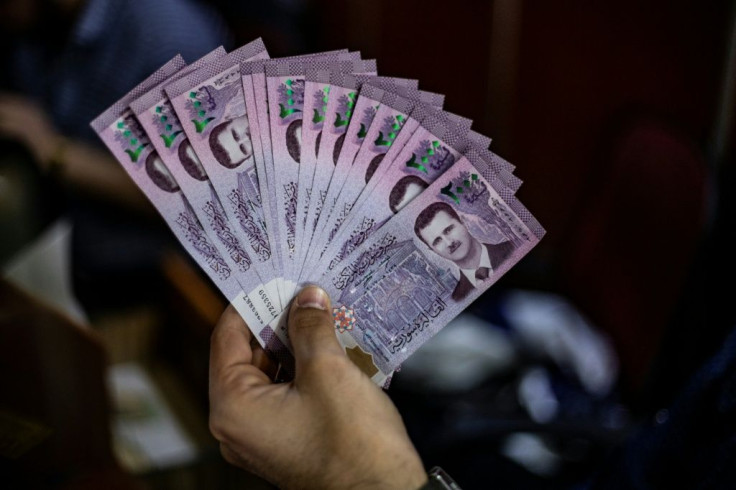Collapse Of Syrian Pound Deals Blow To Struggling Shops

Mohammad Zarqawi ambled around his narrow shop in central Damascus, filling plastic bags with colourful spices and herbs, their aroma spilling out into a dim market once bustling with customers.
The middle-aged shop owner said business has slowed since the value of the Syrian pound against the dollar plunged to its lowest level in history this month.
"When we fall asleep it's one price and when we wake up it's another," he said in his shop in Al-Buzuriyah market, surrounded by jars of popular spices thyme and sumac.
"Every time you want to buy something, you notice a big price difference," he added.
On the black market on September 8, the Syrian pound was trading at 691 against the dollar -- its lowest rate in history -- before it climbed to 610 on Monday.
That is a significant drop from 500 Syrian pounds to the dollar at the end of last year.
At the start of Syria's eight-year war, the rate stood at around 48 pounds to the dollar.
Checking the latest exchange rates on his mobile phone, Zarqawi said currency fluctuations have been "insane".
"Everybody has been impacted... and many customers are reluctant to make purchases," he said, as people whizzed past his shop without entering.
He said sales have been weak in recent days, "even though we usually see a boost in business" before schools reopen.
Dollar drama
The declining value of the pound is a sure sign of Syria's ailing economy.
The civil war has battered the country's finances and depleted its foreign reserves.
A flurry of international sanctions on President Bashar al-Assad's regime and associated businessmen since the start of the war in 2011 has compounded the situation.
According to economic publication Syria Report, the collapse of the pound is due to a number of factors, including a high demand for dollars in neighbouring Lebanon, whose banking system Syrian importers use for their own transactions.
Last week, Syria's cabinet endorsed steps to clamp down on illegal trading of foreign currencies, according to the pro-Damascus daily Al-Watan.
The government agreed to take legal measures against foreign currency dealers who manipulate exchange rates, said the report.
Sitting on a stool near his cosmetics stand in the Old City of Damascus, Haytham Ghanmeh said the fall of the pound has been especially hard on business owners who sell imported goods, usually purchased in dollars.
"The rise of the dollar is pushing up prices, and most of my products are imports," said the 58-year-old, bottles of bright nail polish lined up beside him in a neat display.
"There are a lot of products that you can no longer find in the market because we've been reluctant to buy them at the new price," he said.
In the Kurdish-majority city of Qamishli in northeast Syria, governed by a semi-autonomous Kurdish administration, the situation is just as grim.
The slide of the Syrian pound "has impacted all the Syrian people," said Fayez Ahmed, who also owns a cosmetic store.
"Beauty products have become more expensive and our customers' salaries are no longer enough," he told AFP.
'How can we live?'
In a nearby grocery store, Hussein Hammou said his clients are growing sceptical of his prices because of stark and swift changes.
"We buy goods in dollars... and the customer is surprised that prices vary from hour to hour," said the 24-year-old, the shelves of his shop crammed with canned food.
Instead of his customers buying supplies for a month as they usually do, many are opting for smaller quantities to make up for price hikes, he said.
This has created a surplus in stock, making it difficult to settle debts owed to suppliers, he added.
"The situation is catastrophic, the value of the dollar is very unstable, and prices are rising every day," Hammou told AFP.
"Every evening, we go to convert Syrian pounds to dollars and lose a lot" of money in the process.
In a market in Qamishli, Ronahi Hassan scanned stalls for school supplies for her children.
"We can no longer live with these crazy price hikes," she told AFP.
"Each day the dollar rises, our burdens increase," the 33-year-old said. "How can we live... when our salaries are only enough for a few days?"
© Copyright AFP 2024. All rights reserved.





















